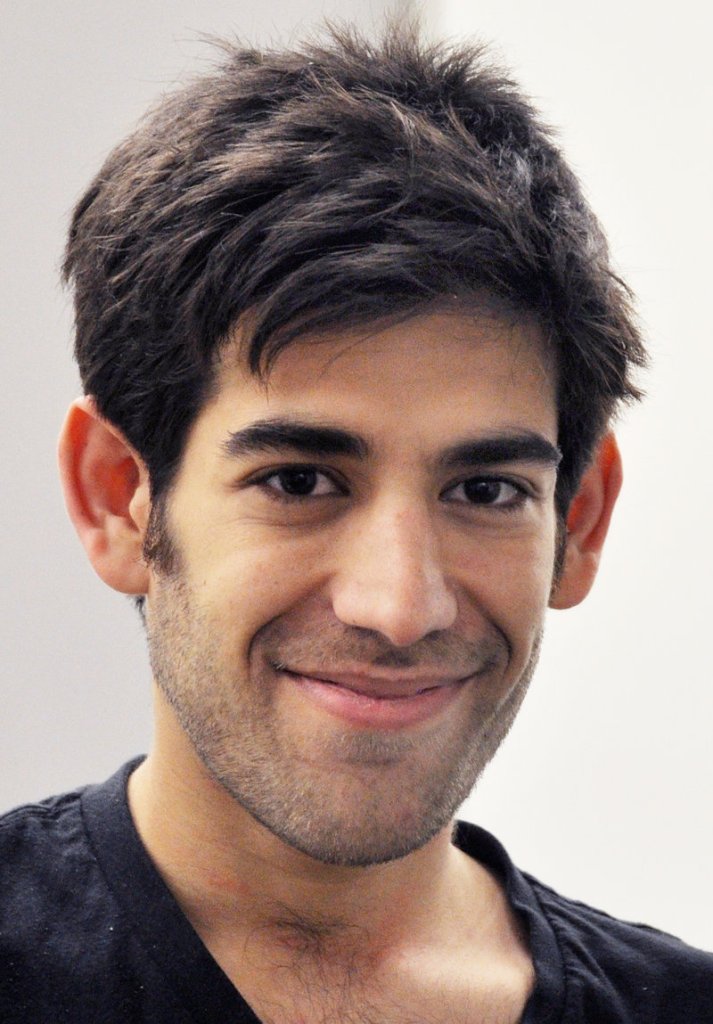BOSTON – Since his suicide, friends and admirers have cast free-information activist Aaron Swartz as a martyred hero hounded to his death by the government he antagonized. One newspaper columnist – whose piece on Swartz was accompanied by a photo showing him at his computer, his head encircled by a golden halo – even compared him to an Internet-age Martin Luther King Jr.
But those closest to the 26-year-old Swartz say the hacker prodigy wasn’t out to be a hero. Rather, he was a painfully shy young man who felt passionately that government and big business had hijacked the Web and he hoped to make a difference.
In the end, they say, Swartz failed to fully appreciate the threat he embodied to some.
“It was an act of personal risk,” said James Grimmelmann, a professor at New York Law School who had known Swartz for six years. “I don’t think he understood just how much the system would come down on him over it.”
Swartz, a wunderkind who helped create Reddit and RSS, the technology behind blogs, podcasts and other Web-based subscription services, was found dead Friday in his New York apartment.
Swartz’s friends and family blame federal prosecutors for his suicide, saying they pursued him relentlessly in the years since he helped post millions of federal court documents for free online rather than the few cents per page charged by the government through its electronic archive.
He was never indicted. But three years later, he was charged in Boston with using the Massachusetts Institute of Technology’s computer network to download nearly 5 million academic articles from an online clearinghouse for scholarly journals.
His lawyer, Elliot Peters, said prosecutors were insisting he plead guilty to all 13 felony charges and serve four to six months in prison or go to trial and face up to 35 years. Swartz rejected that offer, saying he didn’t want to be branded a felon.
Since his death, his family, friends and supporters have unleashed a torrent of anger online: a petition calling on President Barack Obama to fire the federal prosecutor who charged him, a flood of copyrighted academic papers put online for anyone to see and a flurry of furious rants on Twitter.
Though even some of his supporters say they believe Swartz broke the law, they say the penalties for a crime they equate with trespassing are inordinately harsh.
This much is certain, though: Regardless of how he may have viewed himself, in death Swartz has become the face of a raging debate over how hard the government treats electronic protests in the Internet age.
U.S. Attorney Carmen Ortiz and Assistant U.S. Attorney Stephen Heymann, the lead prosecutor on the case, have not commented publicly on the anger directed at them over Swartz’s suicide. But in a news release at the time of Swartz’s indictment, Ortiz defended the charges.
“Stealing is stealing whether you use a computer command or a crowbar, and whether you take documents, data or dollars,” she said. “It is equally harmful to the victim whether you sell what you have stolen or give it away.”
Robert Swartz, who said at his son’s funeral that he was “killed by the government,” said in a later interview that his son occasionally got depressed but was never diagnosed with clinical depression and never took medication for it. The suicide, he said, was “due to the fact that he was put under relentless, incredible pressure.”
Whether Swartz broke the law or not, many supporters see him as a modern-day leader of the “free culture” movement to make information available on the Internet at no charge.
“This crime had no victims. He wasn’t ever intending to profit in ANY way, not one penny,” said Glenn Greenwald, a columnist for the British newspaper The Guardian who had communicated with Swartz online over the years.
Greenwald called Swartz “heroic” and even compared him to King, the late civil rights leader.
“I think when you engage in civil disobedience, you make a calculation about the price that you’re likely to have to pay,” Greenwald, a former litigator, said in a telephone interview from his home in Brazil.
Send questions/comments to the editors.



Success. Please wait for the page to reload. If the page does not reload within 5 seconds, please refresh the page.
Enter your email and password to access comments.
Hi, to comment on stories you must . This profile is in addition to your subscription and website login.
Already have a commenting profile? .
Invalid username/password.
Please check your email to confirm and complete your registration.
Only subscribers are eligible to post comments. Please subscribe or login first for digital access. Here’s why.
Use the form below to reset your password. When you've submitted your account email, we will send an email with a reset code.